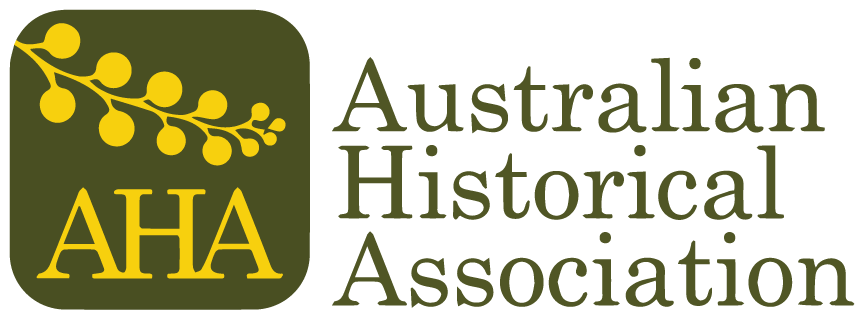Thurs 20 June 5:30 – 7pm UTS Building 10:14.201

Chair: Kiera Lindsey (UTS)
Australian history is a rich and often contested disciplinary field that is constantly shaped by its entanglement with public debate and scholarly conversation. In this seminar three speakers discuss how their work is informed by both a personal sense of purpose and diversity of disciplines that invite fresh approaches to the provocation: ‘What could and should Australian history be doing right now?’
Kirsten Thorpe, UTS
Living Indigenous Archives
Our major cultural and collecting institutions – across the GLAM (Galleries, Libraries, Archives and Museums) sector – hold records that document Australia’s history of colonisation including genocide, dispossession, and forced control over the lives of Indigenous Australian people, families, and children. By their very nature, these records and collections are biased and they frequently silence Indigenous Australian people’s histories, cultures and experiences. Emerging areas of research and scholarship relating to the archival multiverse, living community archives, and Indigenous cultural safety offer pathways for these archives to be decolonised. This panel presentation will discuss the importance of transforming the archive to ensure that Indigenous Australian people have a right of reply to records. It will discuss ways in which Indigenous worldviews and priorities are being asserted to ensure that archives are managed with respect to Indigenous protocols and self-determination into the future. Kirsten will also briefly discuss the development of the Australian NSW Mukurtu Hub launched at UTS in late 2018, a project which aims to empower Aboriginal and Torres Strait Islander peoples to tell their own stories.
Bio: Kirsten Thorpe (Worimi, Port Stephens NSW) is a Senior Researcher, Cultural and Critical Archivist at the Jumbunna Institute for Indigenous Education and Research at the University of Technology Sydney, and a Ph.D. student with the Faculty of Information Technology, Monash University. Kirsten is a professional archivist who has led the development of protocols, policies, and services for Aboriginal and Torres Strait Islander peoples in libraries and archives in Australia. Kirsten’s research interests relate to Indigenous self-determination in libraries and archives. She has been involved in numerous projects that have involved the return of historic collections to Indigenous peoples and communities, and advocates for a transformation of practice to center Indigenous priorities and voice regarding the management of data, records, and collections.
Janson Hews, Sydney Living Museums
We live in a time where change remains the only constant. We are facing unprecedented and seismic change, where many of our old stories are dissolving and no new stories have emerged so far to replace them. This presents an exciting problem to be solved – the opportunity to explore what could and should Australian history be doing right now to help prepare our children and ourselves for a world of increasing complexity and uncertainty. As the unknown becomes increasingly normalised, our past experiences along with those of the whole of humanity will become less reliable guides in helping us to navigate the demands of the twenty-first century. The paper will focus on what unique learning opportunities and skills history can and needs to provide. In particular the ability for this generation to critically gather, synthesise and differentiate important information and creatively brings these stories together to form a comprehensive and broad picture of the world that is personally meaningful and fosters agency and civic engagement.
Bio: Janson has managed public and learning programming departments at various cultural institutions across Australia and the UK. In his current role as Head of Experience and Learning at Sydney Living Museums he is responsible for designing and delivering an integrated program of rich cultural and learning experiences across 12 museum sites. Previously he was Manager of Partnerships & Festivals at the Museum of Applied Arts & Sciences (MAAS), where he was responsible for managing one of the world’s longest design running festivals, Sydney Design, as well as the Sydney Science Festival and Sydney Maker Faire. Prior to this he was the Schools Manager at the Victoria & Albert Museum, London, where he oversaw programming for the new Sackler Centre for Arts Education, aimed at providing career and education pathways into the UK’s creative industries.
Heather Goodall, UTS
History in Australia has the opportunity to explore social, political and cultural interactions across the region and beyond. Recently, Australian history has broadened with long overdue recognition of Indigenous peoples, but this needs further development – recognising not only conflict and unequal power relations but also diverse and intersecting cultural enrichment across the many cultures of Indigenous Australia. There are more possibilities – firstly, recognizing the more-than-human world, led by Indigenous Australians. This raises the challenges social scientists often feel when asked to work collaboratively with community analysts and with natural scientists. But further still, recognising that people living in Australia have always interacted with places and people beyond continental or political borders. This includes past interactions, beyond the colonial, like those of Indigenous people as well as in the twentieth century. It opens up analysis of the ways that emerging technologies – from steam ships and telegraph to the internet – have accelerated such connections. It asks us to consider processes of migrancy, described by geographers and cultural analysts including Doreen Massey, Iain Chambers and Ben Rogally, which envision places not as fixed and material, but as hubs in the networks of people’s lives, involving memory, meanings, imagination – and conflicts – as much as the more-than-human world.
Bio: Heather Goodall, UTS History, researches Indigenous histories and environmental history in Australia, and decolonisation in the eastern Indian Ocean. Her publications include: Invasion to Embassy: Land in Aboriginal Politics in NSW (1996); Rivers and Resilience (2009 with Allison Cadzow); Isabel Flick: Many Lives (2004) with Gamilaraay activist Isabel Flick; Making Change Happen (2013) with Wandandian activist Kevin Cook; Beyond Borders: Indians, Australians and the Indonesian Revolution, 1939-1950 (2018) and, forthcoming, with Helen Randerson and Devleena Ghosh: Teacher for Justice: Lucy Woodcock’s Transnational Life, (2019, ANU Press). Heather continues work on a social and environmental history of the lower Georges River.
